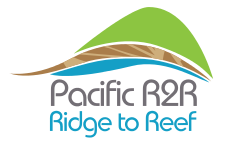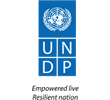Human development is about the expansion of citizens’ capabilities, their access to and opportunities for things they have ‘reason to value’. In development, conventional monitoring and evaluation employs external ‘neutral’ experts and predetermined indicators to measure inputs and outputs, predominantly for accountability of funding.
The Most Significant Change (MSC) technique is a form of participatory monitoring and evaluation whereby project stakeholders are involved both in deciding the sorts of change to be recorded, analysing the data, and ultimately empowering stakeholders to take action.
The Pacific Ridge to Reef Programme developed and implemented an innovative 2-month long capacity-building activity trialling the application of a newly developed MSC tool, culminating in a 2-day regional workshop with over 40 programme-related representatives from 14 Pacific Island countries at the margin of the Pacific R2R 4th Regional Steering Committee meeting in Nadi, Fiji in July.
In describing this initiative, SPC Pacific R2R Regional Programme Coordinator Peter Cusack, said: “The GEF Pacific R2R Programme brings opportunity to the region through an R2R or ‘whole-of-island’ natural resource management approach, supporting locally-driven solutions that mobilizes communities to take local action with global benefits.”
“The MSC tool helps development communities articulate the value of solutions that may support the performance of projects and programs and guide future investment,” he added.
Pacific R2R Communication and Knowledge Management Advisor Dr. Fononga Vainga Mangisi-Mafileo, who designed and coordinated the capacity building exercise, explained: “MSC involves the collection and systematic participatory interpretation of stories of significant change emanating from the field level. Through the active participation of diverse stakeholders, the MSC focuses on shared visions and explicitly-valued aspects of interventions that may not be initially specified in design documents.”
Dr. Mangisi-Mafileo also noted that: “The innovative application of the tool and the MSC methodology itself, enriches the summative evaluations of complementary monitoring and evaluation tools, such as logic models, and outcome mapping –especially where projects and programs have diverse, complex outcomes with multiple stakeholders groups and implementing agencies, such as the Pacific R2R Programme.”
“Importantly, the technique’s dependence on participatory monitoring and evaluation enhances the chances that lessons will be learned and that recommendations will be appropriately actioned,” she concluded.
The regional MSC workshop received a submission of over 20 stories from the 13 participating Pacific R2R Programme countries. Through a 3-tier – national, sub-regional and regional assessment by project stakeholders. Fiji’s impact story on behavioural change, and Tonga’s on their community to cabinet approach to strengthening governance, and FSM on Dry Litter technology were acclaimed by the participants as the top three in the region.
Fiji R2R STAR Manager Beverly Sadole said: “This capacity-building exercise through MSC was very useful for us as a form of participatory monitoring and evaluation where we were able to engage our stakeholders in exploring, recording, analysing and prioritizing development impacts.”
“This exercise has been very effective, because now we are able use the MSC technique on our own,” she said.
Tonga R2R IW Project Manager, Silia Leger noted: “The designated staff and stakeholders are initially involved by 'searching for and capturing' project impact. We sit down together, read the stories and have in-depth discussions about the ‘value’ of the reported changes and how this can support continuous learning and improvement in projects and programs.”
“This is an excellent tool, and I would encourage all development practitioners to use it,” she urged.
FSM R2R STAR Project Manager Rosalinda Yatilman said: “This tool has equipped us to bring rich narrative to illustrate the impact of our work with communities, and strengthen our continued engagement.”
The MSC tool was designed to improve the awareness of the R2R principles by project stakeholders, and will be reinforced through annual applications and workshops.
Participating countries included: Cook Islands, Federated States of Micronesia , Fiji, Kiribati, Nauru, Niue, Palau, Papua New Guinea, Republic of the Marshal Islands , Samoa, Solomon Islands, Tonga, Tuvalu and Vanuatu.
Dr Mangisi-Mafileo later presented the MSC technique and Pacific R2R’s experience with it at the Caribbean Large Marine Ecosystem Forum in Cartagena, Colombia in September, resulting in a request by the Caribbean IWEco project to replicate it in 2020.





